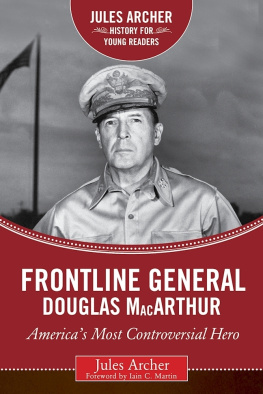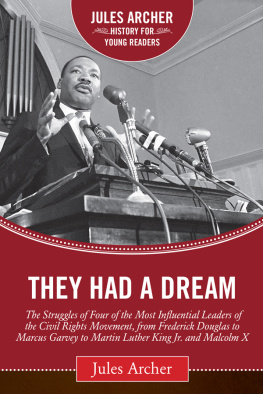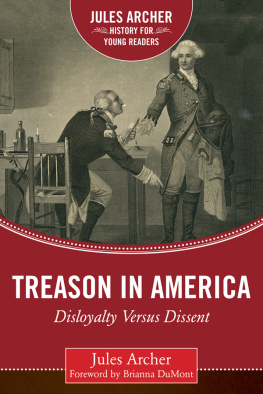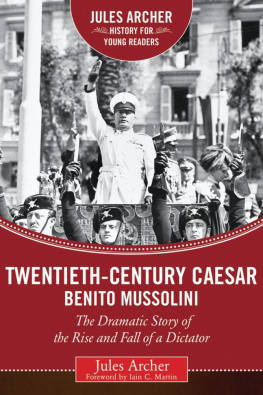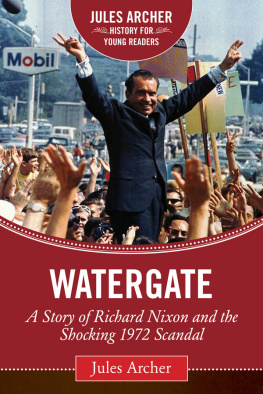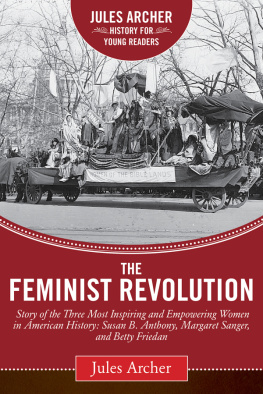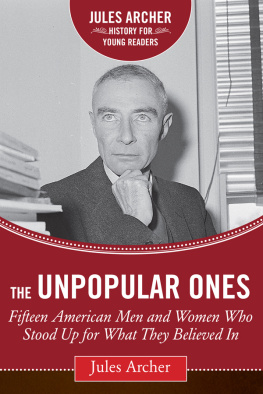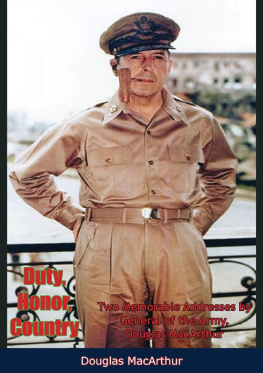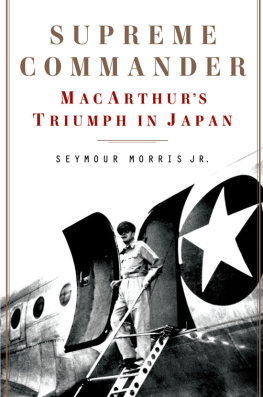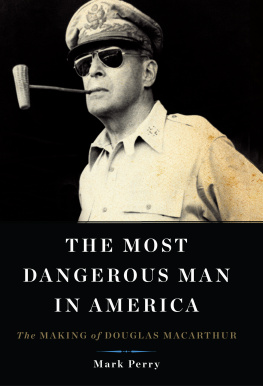Historical texts often reflect the time period in which they were written, and new information is constantly being discovered. This book was originally published in 1964, and much has changed since then. While every effort has been made to bring this book up to date, it is important to consult multiple sources when doing research.
Copyright 1964 by Jules Archer
Foreword 2017 by Sky Pony Press, an imprint of Skyhorse Publishing, Inc.
First Sky Pony Press edition, 2017
All rights reserved. No part of this book may be reproduced in any manner without the express written consent of the publisher, except in the case of brief excerpts in critical reviews or articles. All inquiries should be addressed to Sky Pony Press, 307 West 36th Street, 11th Floor, New York, NY 10018.
Sky Pony Press books may be purchased in bulk at special discounts for sales promotion, corporate gifts, fund-raising, or educational purposes. Special editions can also be created to specifications. For details, contact the Special Sales Department, Sky Pony Press, 307 West 36th Street, 11th Floor, New York, NY 10018 or .
Sky Pony is a registered trademark of Skyhorse Publishing, Inc., a Delaware corporation.
Visit our website at www.skyponypress.com.
10 9 8 7 6 5 4 3 2 1
Library of Congress Cataloging-in-Publication Data is available on file.
Series design by Brian Peterson
Cover photo credit Associated Press
Print ISBN: 978-1-63450-168-2
Ebook ISBN: 978-1-5107-0698-9
Printed in the United States of America
To the beloved members of my private armyEleanor, Mike, Dane, Kerry, and Momwho had a personal stake in the MacArthur victories at Milne Bay and Markham Valley.
Grateful acknowledgment is made to Mr. Paul B. Basco, administrative aide to General MacArthur, for supplying firsthand information and comment from the General to clarify some points raised by the author.
The author is indebted to Pyramid Publications for permission to adapt in different form the authors account of MacArthurs adventure in Mexico, and also the Buna affair, both of which originally appeared in Mans Magazine .
For the chapters dealing with World War II in Australia, New Guinea, and the Philippines, the author has also drawn upon his personal experiences during four years in the Pacific.
A special debt of gratitude is owed to the authors wife Eleanor, to Miss Edith Margolis, and to Dr. Randolph G. Goodman of Brooklyn College, for their invaluable support and help en route.
Jules Archer
Pine Plains,
New York
CONTENTS
FOREWORD
Duty, Honor, Country
Few leaders in American history have been more revered, mistrusted, and feared than General Douglas MacArthur. He was hailed by many as an iconic leader, a genius for war who accomplished seemingly impossible tasks with few resources. Yet he was distrusted by those who saw his vanity and the carefully crafted public image as the trappings of a charlatan. President Franklin Roosevelt once famously quipped that Douglas MacArthur was the second most dangerous man in America after Huey Long (a firebrand populist political rival of FDR). MacArthurs thinly veiled political ambitions inspired trepidation in some, and strong support from others. Many Americans anticipated he might capitalize on his fame to make the final leap from military command to the White House.
Douglas was born into an Army life at the Arsenal Barracks in Little Rock, Arkansas on January 26, 1880. His father, Arthur MacArthur Jr. was an Army captain from Massachusetts who, as a young man, won the Medal of Honor during the Civil War at Missionary Ridge. Arthur eventually became the Military Governor of the Philippines, and later the commander of the Department of the Pacific. His mother, Mary Pinkney Hardy MacArthur, was an educated southern belle from Norfolk, Virginia. Together they instilled in the young MacArthur a love of country, a sense of duty, and a belief that he was destined for greatness like his father. His service would begin at the twilight of the western frontier before the age of flight and end fifty-two years later just before the first intercontinental nuclear missiles would change warfare forever.
Douglas wasted no time in blazing a path to command. Gifted with a genius intellect, a commanding personality, a famous name, and a strong physique, MacArthurs future seemed assured. As a cadet at West Point he achieved the highest honors, making First Captain at the top of his class of 1903. During the First World War he won glory as a front line officer with the 42nd Rainbow Division in France. Promoted to Brigadier General at the age of thirty-nine, he became the youngest superintendent of the West Point Military Academy since its founding.
At West Point MacArthur instituted much needed reforms to improve the cadets education beyond military science. Recognizing that future generals would also need to undertake civil and diplomatic missions, the curriculum was expanded. Douglas also emphasized the importance of sports as a cornerstone of building teamwork and character. Every cadet an athlete became a consequential goal. On MacArthurs order this maxim was carved into the stone portals of the academy gymnasium, On the fields of friendly strife are sown the seeds that on other days, on other fields will bear the fruits of victory.
As Americas youngest Major General at the age of fifty he became the Armys Chief of Staff and oversaw a reorganization of the Army and the implementation of President Roosevelts Civilian Conservation Corps. When Congress approved the formation of the CCC in March 1933, Roosevelt hoped to have 250,000 men enrolled in work camps across the country by July. Only with the Armys help was such a goal possible and the task was given to MacArthur. By July the general had three hundred thousand men enrolled, thus making the CCC one of Roosevelts key New Deal success stories.
At the age of fifty-five MacArthur agreed to oversee the creation of the Philippine Army for President Manuel Quezon. To this end, he was allowed to assume the rank of Field Marshall of the Philippine Army. MacArthur also retained his status as a Major General in the United States Army and the official US advisor for the island nation.
His career by then would have been deemed accomplished by any measure yet his greatest challenges still lay ahead. When Japanese bombers attacked the Philippines on December 8, 1941 most American aircraft were caught on the ground and destroyed. Following the Japanese invasion of Luzon, MacArthur fought a delaying action while his forces retreated onto the Bataan peninsula where they dug in. MacArthur and his forces awaited Allied reinforcements for months, but with no relief forthcoming, President Roosevelt instead ordered MacArthur to evacuate to Australia where he would lead an eventual counterattack.
In an audacious eleven-day escape that began on March 12, 1942 from Corregidor Island, MacArthur and his family evaded capture thanks to daring PT boats and aircraft. Stunned on his arrival in Australia that no Allied army awaited him, MacArthur vowed to reporters on his intent to avenge the loss of the Philippines, I came through and I shall return. Here was a glimpse of the real MacArthur, who on his own initiative, proclaimed the military goals of the United States without consulting Washington. When officially asked to amend his statement to we shall return MacArthur ignored the request. In the United States MacArthur was proclaimed a hero and was awarded his long-sought-after Medal of Honor to shield him from any disgrace.
The stage was now set for a military campaign to turn the tide of Japanese conquest and advance the Allies toward Japan. MacArthur was appointed Supreme Commander of Allied Forces in the Southwest Pacific Area on 18 April, 1942. Using all his abilities as a statesman and a soldier, and learning hard lessons along the way, McArthur led an island-hopping strategy from the jungles of New Guinea, up through the Solomon Islands all the way back to the beaches of Leyte in the Philippines. When MacArthur triumphantly waded ashore on October 20, 1944 he addressed the Philippine people by radio from the beach, People of the Philippines: I have returned.

